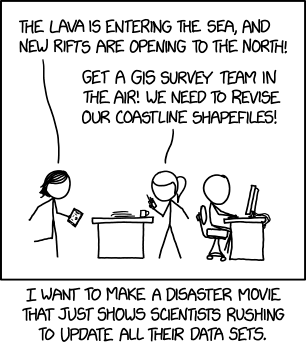Disaster Movie
(source: Disaster Movie - https://www.xkcd.com/2029)
Instructor
Unmil Karadkar (@unmil, please do call me by first name) How to contact me: email: via canvas or to unmil-At-ischool.utexas.edu (please include the text "INF385S" in your subject line) with prior appointment in-person meeting or, videoconference skype: unmil.karadkar, Google hangouts: unmil-aT-utexas-dot-edu (please don't send email to this address) drop by my office without an appointment–I will try to make time for you |
Class Meetings
Classroom: UTA 1.204 Course unique id: 27742 Canvas page: https://utexas.instructure.com/courses/1231843 iSchool description: Research, development, and evaluation issues in digital libraries, including collection development and digitization; provision of access to multimedia materials; access strategies and interfaces; metadata and interoperability; and the implications of digital libraries with respect to policy and social issues. Three lecture hours a week for one semester. |
Prerequisites
- An interest in subject materials
- Motivation to learn more as necessary for your project
Readings
No textbook. Assigned readings will be available online or made available via Canvas. Some online readings are only available to UT Austin students and you may access these off-campus via UT-VPN or via the libraries' web site.
Introduction
Personal photographs, scanned historical documents, social media posts by friends, colleagues, and influencers, data sets generated by sensors and other instruments are all indispensible for our personal, professional, intellectual, social, cultural, and political activities. As more and more data becomes available, we need better tools to organize, manage, present, and deliver this content. This course will introduce you to good practices for creating and managing useful, sustainable data collections as well as to evaluate the intellectual and software infrastructure for ensuring the longevity of these collections.
Pedagogy and Organization
Class time will be split between short content-based lectures, reading discussions & debates, and group activities. Lectures will highlight important aspects of assigned readings as well as introduce you to related materials. The goal is to create a learning environment in the classroom where we raise significant questions, discuss concepts, and develop skills collaboratively. This course is designed as a Flipped Classroom course. This format requires participation of all class members. Students are expected to:
|
Learning outcomes
At the end of this course, you will be able to:
|
My Personal Goals
In addition to the content-specific objectives, I will do my best to:
|





